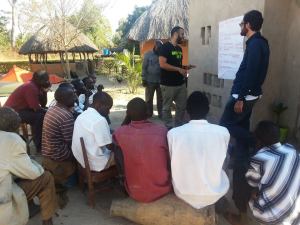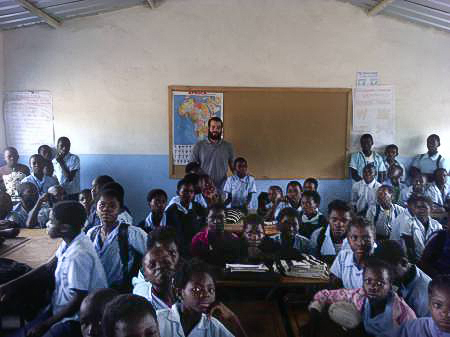This month we’re looking at two men – one a young college graduate and the other a distinguished diplomat – whose experience as part of the Bloomingdale “family” gave them a head start on their life’s journey.
The diplomat is Patrick Gaspard: union leader, member of the Obama administration, and currently our country’s Ambassador to South Africa. He tells his story in this video produced by the National Head Start office which can be seen here.
Our other alumnus is Louis Rodriguez: college graduate, Peace Corps volunteer, and currently Care Coordinator at a major NYC social service agency. Here’s how Louis tells his story:
Bloomingdale has always been a home to me. I grew up in the heart of Manhattan at a time when crime in Harlem was declining drastically, but still present. It was a situation that forced the best and worst out of anyone. I first set foot in a classroom at the age of three, and I was greeted by amazing teachers, wonderful staff, and children my age — many of whom have become life-long friends.
The staff at Bloomingdale has always been special. They care for, respect, and support each other, and have the same care, respect and support for the students and their families. They find creative ways to expand the young minds that enter the classrooms. They do not just teach, they engage; they do not just instruct, they involve; they do not just coordinate, they collaborate. This is why I always volunteered at Bloomingdale when the opportunity presented itself. I volunteered during high school, and in college I did an internship focusing on health education, creating activities integrating nutrition into the children’s learning of colors and shapes. It was an exciting time for me.
Bloomingdale does not forget about you. The alumni meetings are powerful. I actually applied to SUNY Oswego because Bloomingdale offered an alumni panel on college admission. My friend Jamil spoke about Oswego, describing his experience there. Furthermore, the panel gave us insight on how to prepare for college admission and expectations. I graduated in 2014 with a Bachelor of Science in Health Promotion and Wellness. As I walked on the stage to accept my degree, I remembered all the people who helped me along the way. It was a triumphant moment for us all.
After graduation, I served with the Peace Corps in Zambia. There are no words to describe what serving in the Peace Corps has been like. I lived in a village called Kampelembe in the Luano District of Central Province. I experienced every emotion I have ever experienced so rapidly and intensely, abyssal lows, and mountainous highs. It was a pleasure to be a part of my Bemba Tribe, and to immerse myself in the language, the food, the clothing, the holidays. I experienced life in a close-knit rural community where everyone knows everyone and helps each other. I met some of the most warm, loving, and giving people in Zambia.
 It’s a cliché to say “I learned a lot about myself” in Zambia, but when you live in a place that is completely unaware of the things you identify with, where there is no accessibility to sources of information such as the internet, or even phone service, it forces you to find different words to describe yourself. Add a language barrier, and you soon begin to see yourself differently. These new lenses of introspection inspired revelations of self that have proven to be powerful.
It’s a cliché to say “I learned a lot about myself” in Zambia, but when you live in a place that is completely unaware of the things you identify with, where there is no accessibility to sources of information such as the internet, or even phone service, it forces you to find different words to describe yourself. Add a language barrier, and you soon begin to see yourself differently. These new lenses of introspection inspired revelations of self that have proven to be powerful.
My work today is as Care Coordinator at the Jewish Board of Family Services here in New York City. We serve a very vulnerable population, and part of my job is making sure that our clients know about and benefit from the treatment and service options available to them. My experience there has affirmed my desire to continue my education and work toward a Master’s degree in Health Policy.
There are many goals that I’d like to accomplish. On the grand scale, my goal in life is to be a person who motivates another person to start thinking – to ponder even for just a moment. I have headed in this direction since I was an adolescent. When I was 10 years old I went to the Dominican Republic, and I remember seeing a young boy running in the rain without anything on his body but a bag on his head. I asked myself ‘Why was the boy like that? How does he feel about it? Are he and I very different?’ To this day, I sit on a train and observe and wonder about the people around me. Pondering offers insight. Empathy offers us community. The way we ask questions is important, and my goal is to get people to start asking questions.
Asking questions doesn’t always come easy to people in a low-income culture, where people tend to be more fluent in nonverbal communication. This hinders us in many ways, but particularly affects the ability to survive in higher education. I say this because academia was built around middle class norms. People in the middle class are more fluent in verbal communication and tend to be proactive in filling gaps in their information. When someone from a low income family enters the halls of higher education, they’re immediately impaired because they are much less likely to plan, to coordinate, and — the biggest deficit of all — ask questions. It is a culture shock we all experience and that we need to overcome. I loved learning my entire life but it took until my sophomore year at SUNY Oswego to finally learn how to be a student. I learned by asking questions. The questions were always there, but I had to learn how to be verbal and speak my mind.
My advice for children growing up in the community is to ask questions. And not just the Who, the What and the When; ask the Why and the How. Bloomingdale has never stopped asking the question: how can we do better for our children and families? That way of thinking has made the Bloomingdale Family Program a critical part of the families who trust this program.

